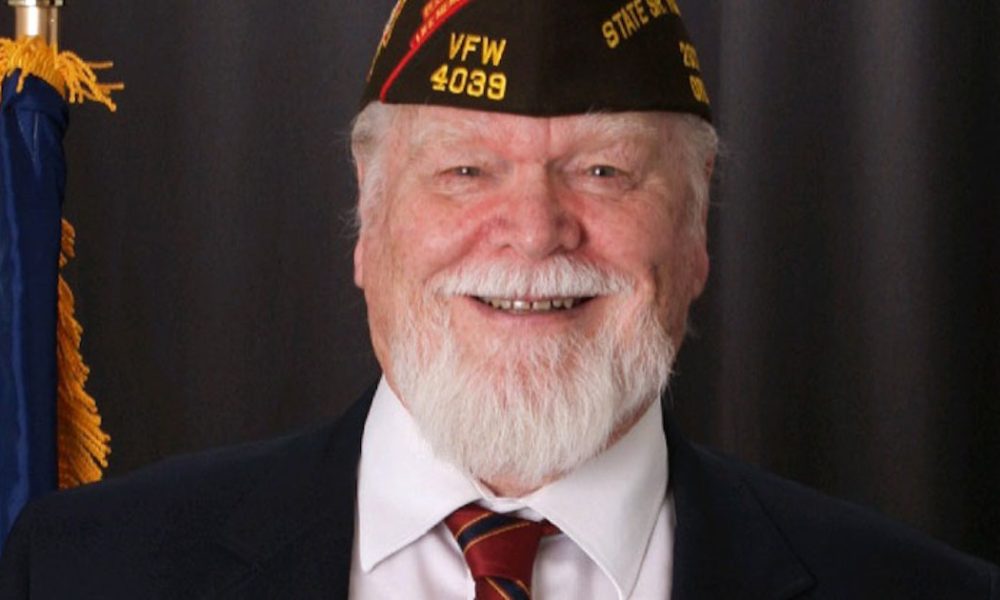 On June 16, 2018 Rick Higgins was elected Oregon state commander of the Veterans of Foreign Wars (VFW). PHOTO PROVIDED
On June 16, 2018 Rick Higgins was elected Oregon state commander of the Veterans of Foreign Wars (VFW). PHOTO PROVIDED
The national motto for the Veterans of Foreign Wars (VFW) is no one does more for veterans. Rick Higgins, who was recently elected State Commander for the VFW Department of Oregon, does his part to make that a reality.
Higgins accepted the position in June, but his history with the organization goes back to 2009.
Within five months of joining the VFW, Higgins was made Post Commander for 4039 Creswell. From there he was appointed National Aid-to-Camp, District 13 Commander, National Deputy Chief of Staff, Department of Oregon Chairman for Citizenship, Prisoner of War and Missing in Action, Department of Oregon Membership Committee, National Internal Affairs Committee, Department Surgeon Position and State Commander. He has received numerous honors, including All-State and All-American recognitions.
Higgins served in the Vietnam War from November 1967 to ’69 as First Cavalry Division Rifleman and Radiotelephone Operator. He received a Bronze Star, Army Commendation Medal, Air Medal, Vietnam Service Medal and Purple Hearts for being wounded three times in battle.
”I wanted to make a career out of the service, but they wanted to send me back to Vietnam,” he said. ”I had been there and had been wounded three times. I decided I didn’t want to roll the dice.”
He said he is proud of his service, despite the Post-Traumatic Stress Disorder (PTSD) that came along with it.
He said it’s hard to explain to someone who hasn’t experienced it before, but it’s not unique to veterans; victims of major car crashes, rape and more can relate to the trauma.
”Those memories haunt you the rest of your life; they never go away,” he said. ”I’m no different. I came home and buried everything I could to move forward, and as I got older it would haunt me. I got help, and counseling helped to a degree, but what’s helped me more is being involved with other combat veterans.”
Higgins said he believes in the VFW mission, and he loves the organization. He said there are other veteran-focused national organizations, but for every one that does a lot, there are some that do little to nothing to actually help veterans.
As state commander he is responsible for over 20,000 VFW and auxiliary members, and it’s an obligation that he takes seriously.
The VFW promotes veteran issues from the local level, all the way to Washington D.C. Although, Higgins said nothing moves fast in D.C., there have been large and small victories all the time.
The organization is responsible for the GI Bill, which gives veterans an opportunity to pursue a college degree, as well as Teacher of the Year award and scholarship programs for children.
At the local level, Higgins said the 4039 Post is working with the Boy Scouts to find a new home for them. They have adopted a National Guard unit, and the post supports the families of military members. They host BBQs and Christmas dinners as well as distribute Buddy Poppies in remembrance of veterans.
”It makes me proud to represent this organization,” he said. ”I have heart to love the organization, and it does so much for veterans and present military.”
One program that Higgins is especially passionate about is pushing suicide awareness. He said that on average 22 veterans die by suicide a day.
”One is too many and 22. . . That’s a lot,” he said. ”My mission is to reach out to them, and if a comrade is hurting, even if you have to take them by the hand and say, ‘I’ll make the phone call,’ let’s get you to talk to people. There is help available for all veterans. Too many people will say, ‘He’s a wacko vet;’ no, he’s a vet with a problem.”
Higgins has used the services in Eugene himself, and while counseling won’t rectify the issue, addressing mental health and seeking out those services can help.
Helping veterans is important to Higgins because someone needs to step in when the government fails. He said that veterans who swear into the military include their life, and there’s a disconnect if they’re willing to die for their country’s freedom, but the country isn’t willing to support them after.
”Politicians do a good job of sending people away,” he said, ”but they don’t do a good job of taking care of them when they come home.”








